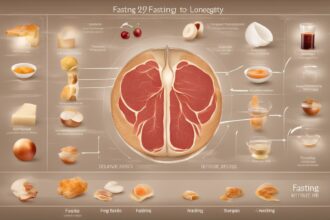Have you ever wondered if the secret to a longer, healthier life could be as simple as changing when—and how often—you eat? Welcome to the world of anti-aging fasting, a powerful practice that’s gaining traction for its potential to slow down the aging process and promote longevity. Fasting isn’t just about weight loss or detoxing; it’s a scientifically supported strategy that taps into your body’s natural ability to repair and rejuvenate. In this post, we’ll dive deep into how fasting can be your ally in the fight against aging, explore the science behind it, and share actionable tips to incorporate it into your life. Whether you’re a fasting newbie or a seasoned pro, let’s uncover how skipping a meal (or two) might just add years to your life!
What Is Anti-Aging Fasting and How Does It Work?
At its core, anti-aging fasting refers to structured periods of not eating, designed to trigger biological processes that combat aging at the cellular level. This isn’t about starvation or extreme deprivation; it’s about giving your body a break from constant digestion to focus on repair. When you fast, your body enters a state called autophagy—a cellular “clean-up” process where damaged cells and proteins are recycled. Studies, like those published in Nature, show that autophagy plays a critical role in reducing inflammation and oxidative stress, two major drivers of aging. By integrating fasting for longevity into your routine, you’re essentially hitting a reset button on your cells, paving the way for healthier aging.
The Science Behind Fasting and Longevity
The link between fasting and anti-aging isn’t just anecdotal; it’s backed by a growing body of research. Intermittent fasting (IF), one of the most popular methods for anti-aging fasting, has been shown to improve metabolic health, reduce insulin resistance, and even extend lifespan in animal studies. A 2019 study in Cell Metabolism highlighted how fasting activates pathways like sirtuins—proteins associated with longevity. Additionally, fasting lowers levels of mTOR, a protein that, when overactive, accelerates aging. These mechanisms suggest that fasting mimics the effects of caloric restriction, a well-documented anti-aging strategy, without the need to permanently slash calories. It’s like giving your body the benefits of a low-calorie diet while still enjoying your favorite foods during eating windows!
Popular Fasting Methods for Anti-Aging Benefits
Not all fasting is created equal, especially when the goal is fasting for longevity. Different approaches suit different lifestyles, so here are some of the most effective methods to consider for anti-aging benefits:
- 16/8 Intermittent Fasting: Fast for 16 hours and eat during an 8-hour window. This method is beginner-friendly and supports autophagy after about 12–14 hours of fasting.
- 5:2 Fasting: Eat normally for 5 days of the week, then restrict calories to 500–600 on 2 non-consecutive days. It’s a flexible way to reduce overall calorie intake.
- 24-Hour Fast: Once or twice a week, abstain from food for a full day. This deeper fast can enhance cellular repair but requires preparation.
- Alternate-Day Fasting: Alternate between normal eating days and fasting or low-calorie days. It’s more intensive but shows promising results for metabolic health.
Choosing the right method depends on your schedule, health status, and comfort level. Start slow if you’re new to fasting and consult a healthcare provider if you have underlying conditions.
Key Benefits of Anti-Aging Fasting for Longevity
Beyond the cellular magic of autophagy, anti-aging fasting offers a host of benefits that directly contribute to a longer, healthier life. It’s not just about looking younger; it’s about feeling younger, too. Fasting impacts everything from brain health to heart function, making it a holistic approach to aging gracefully. Here are some standout advantages supported by science:
- Improved Brain Health: Fasting boosts the production of brain-derived neurotrophic factor (BDNF), a protein linked to cognitive function and protection against neurodegenerative diseases.
- Reduced Inflammation: Chronic inflammation speeds up aging, but fasting lowers inflammatory markers, as shown in studies from the Journal of Clinical Investigation.
- Enhanced Heart Health: Fasting improves blood pressure, cholesterol levels, and insulin sensitivity, reducing the risk of cardiovascular issues.
- Weight Management: By regulating appetite hormones like ghrelin, fasting helps maintain a healthy weight, which is crucial for longevity.
- Cellular Regeneration: Beyond autophagy, fasting promotes stem cell activity, aiding in tissue repair and renewal.
Practical Tips to Start Anti-Aging Fasting Safely
Ready to harness the power of fasting for longevity? Jumping into fasting without a plan can be daunting—or even counterproductive. The key is to ease into it and prioritize safety. Fasting should enhance your life, not stress you out. Here are some practical tips to get started on your anti-aging journey:
First, start small. If you’ve never fasted before, try a 12-hour overnight fast—simply stop eating after dinner and delay breakfast. Hydration is non-negotiable; drink plenty of water, herbal teas, or black coffee during fasting windows to stay energized. Avoid overeating during eating periods; focus on nutrient-dense foods like vegetables, lean proteins, and healthy fats to support your body’s repair processes. Lastly, listen to your body. If you feel dizzy or overly fatigued, break your fast and reassess your approach. Fasting for anti-aging benefits is a marathon, not a sprint, so patience is key.
Potential Risks and How to Avoid Them
While anti-aging fasting offers incredible benefits, it’s not without potential pitfalls. Done incorrectly, fasting can lead to nutrient deficiencies, fatigue, or even disordered eating patterns. For instance, prolonged fasting without proper preparation can cause muscle loss or electrolyte imbalances. To avoid these risks, never fast for extended periods without medical supervision, especially if you’re on medication or have conditions like diabetes. Pregnant or breastfeeding individuals should steer clear of fasting altogether. Balance is crucial—pair fasting with a nutrient-rich diet and avoid pushing your body beyond its limits. Remember, the goal of fasting and longevity is to thrive, not just survive.
In conclusion, anti-aging fasting is more than a trend; it’s a science-backed approach to unlocking longevity and vitality. By tapping into processes like autophagy and reducing age-accelerating factors like inflammation, fasting offers a natural way to slow the clock. Whether you opt for intermittent fasting or a weekly 24-hour fast, the key is consistency and mindfulness. Start small, stay hydrated, and prioritize nutrient-dense meals to maximize the benefits of fasting for longevity. Aging is inevitable, but with the right tools—like fasting—you can age on your terms, with energy and health to spare. Have you tried fasting for anti-aging benefits? Share your experiences or questions below—I’d love to hear how it’s working for you!






